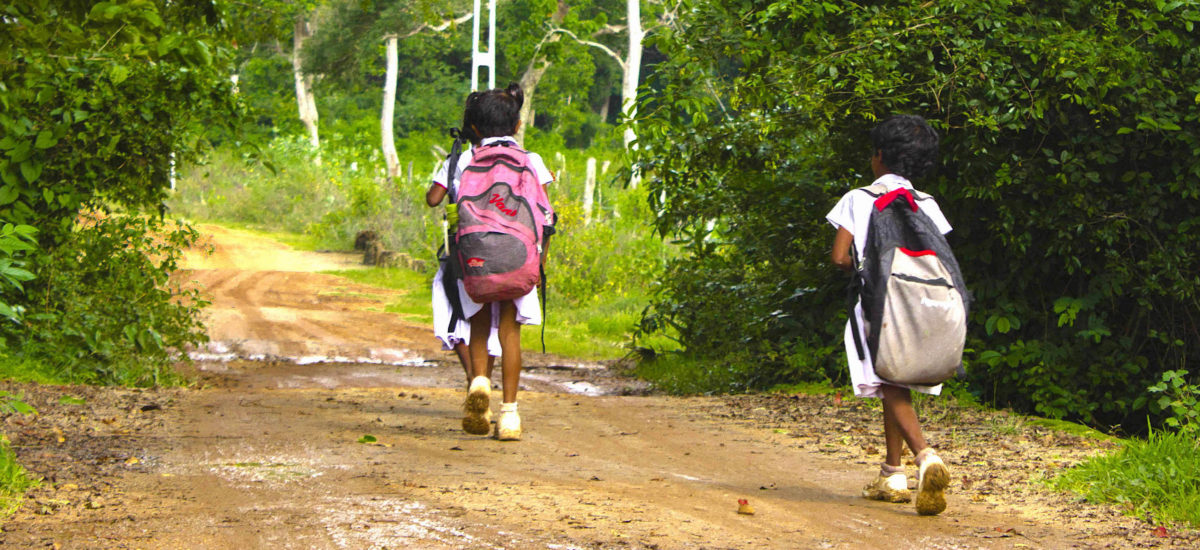They are a small, tight knit community held together by their shared suffering and insurmountable difficulties. Ever since the start of the 1983 civil war, their lives have been marked by tragedy and misery.
The 22 families who live in the village of Kanchanamutti in the interior of the Vavuniya district are refugees who returned from India, some having lived in Tamil Nadu camps for 28 years. They fled their homes in Mullaitivu to escape the bombs and shells that caused havoc and drove them to find shelter elsewhere.
In 2018, they were resettled on the land in Vavuniya; a place to grow paddy, chillies and brinjals, raise some livestock and live in peace. But the reality has been very different. Unable to cope with the harsh conditions, lack of infrastructure and any assistance from the government, 20 families abandoned the village for greener pastures. Their crumbling grey brick houses are being gradually reclaimed by the forest, serving as stark reminders of the failure of resettlement and rehabilitation of people who have already gone through so much trauma.
The land has not been allocated properly, resulting in constant battles between the villagers and the Forest Department. The Vavuniya Divisional Secretariat has portioned off the land and given it to people without consulting the Forest Depart, which is now claiming the land as its own.
“Without coming to survey the land, officials are using google maps and demarcating the land. Now we can’t even go into the forest with an axe or a shovel to get some firewood,” said Bandaram Kadiramalai, who like all the others, does not have deeds for his plot.
The confusion over allocated land led to the arrest of Suppaiah Vishvanathan, a trained baker who was unable to get his business off the ground and has an empty bakery lying unused in his home. Vishvanathan ventured into the forest to plant a crop of cowpea to supplement his meagre income to feed his four children, only to be arrested by Forest Department officials for clearing the forest. The case will be taken up next month.
Despite being resettled by the government, the villagers have no facilities to speak of. There is a primary school but for further studies, older children have to be sent off to Vavuniya or travel to another school in a nearby village on foot along a muddy road. Buses are infrequent and unpredictable while fares have tripled in price.
Each family was given a one acre plot on which they had to build a house and a toilet. The rest could be used for farming but the villagers say this is not enough to earn a decent livelihood. Water for the crops comes from wells as there is no irrigation system so the success of the harvest depends largely on rainfall. The well water is dirty and brackish, unsuitable for human consumption.
“We have no way to live. Other than farming, there are no alternative jobs for us to do. Whatever we grow is for home consumption. The costs have gone so much for urea, diesel and all the other inputs for cultivation. The people who brought us here should help us,” said Kadiramalai, who came to Vavuniya from Kegalle because of the access to land.
Another problem faced by the isolated villagers is the influx of elephants who trample on their crops and eat what they can get. Electric fences were recently put in after the village received electricity one year ago but have yet to be connected. The villagers do not feel the fences will deter the elephants.
To add salt to the wounds, the villagers have to watch as big businessmen cultivate large tracts of land nearby using tractors and other machinery, using fertiliser and making comfortable profits. They are allowed to encroach on to Forest Department land as officials turn a blind eye to their illegal activities.
For S. Thiagararah, who has two young children and another on the way, the immediate problem is how get his wife to hospital when the time comes for the birth. Trishaws won’t accept a trip to Vavuniya, the bus takes too long and he has no money to hire a vehicle.
For Vellaiammah Kadiramalai, life was more tolerable at the Tamil Nadu refugee camp, where she had a job and received a monthly allowance from the government, than in Kanchanamutti. “We were encouraged to come back to Sri Lanka but we had a better life in India,” she said.
Selvaraj Selakumari, looks after six children – four of her own and two of her brother’s. She came to Kanchanamutti from Colombo because her husband was from Vavuniya. The children have to walk two kilometres to school, making sure to dodge any wild elephants along the way. Battered by wind and rain, their tiny one room house that houses eight people is on its last legs. They depend on rain water for their crops and have to drink from a dirty well. “Sometimes I don’t have enough money even to buy a coconut and the bills just keep going up,” said Selakumari.
When they came to settle, the family was promised Rs 500,000 but have only received Rs. 200,000. They are Samurdhi beneficiaries and some NGOs lend a helping hand. “We have no money to go anywhere else so we are just waiting here. Life is very difficult,” Selakumari said.


